- Home
- Paulo Coelho
Like the Flowing River: Thoughts and Reflections Page 10
Like the Flowing River: Thoughts and Reflections Read online
Page 10
However, I also met many people who really were capable of dealing with forces that went far beyond my comprehension. I have seen the weather being changed, for example; I have seen operations performed without anaesthetic, and on one such occasion (on a day, in fact, when I had woken up feeling full of doubts about our unknown powers) I stuck my finger into an incision made with a rusty penknife. Believe me if you like – or laugh at me if that is the only way you can read what I am writing – but I have seen the transmutation of base metal; I have seen spoons being bent; and lights shining in the air around me because someone said this was going to happen (and it did). These things have almost always occurred with witnesses present, usually sceptical ones. Mostly, those witnesses remained sceptical, always believing that it was all just an elaborate trick. Others said it was ‘the Devil’s work’. A few felt that they were witnessing phenomena that went beyond human comprehension.
I have seen this in Brazil, in France, in England, Switzerland, Morocco, and Japan. And what happens with the majority of these people who manage, shall we say, to interfere with the ‘immutable’ laws of nature? Society considers them to be marginal phenomena; if they can’t be explained, then they don’t exist. Most of the people themselves can’t understand why they are capable of doing these surprising things, and, for fear of being labelled charlatans, they end up suppressing their own gifts.
None of them is happy. They all hope for the day when they can be taken seriously. They all hope for some scientific explanation of their powers (although, in my view, that is not the way forward). Many hide their potential and suffer because of that – because they could help the world, but are not allowed to. Deep down, I think they, too, are waiting to be granted an ‘official pardon’ for being different.
While separating the wheat from the chaff, and not allowing ourselves to be discouraged by the enormous number of charlatans in the world, I think we should ask ourselves again: what are we capable of? And then, quite calmly, go off in search of our own immense potential.
On Rhythm and the Road
‘There was something you didn’t mention in your talk about the Road to Santiago,’ said a pilgrim as we were leaving the Casa de Galicia, in Madrid, where I had given a lecture only minutes before.
I’m sure there were many things I didn’t mention, since my intention had been merely to share something of my own experiences. Nevertheless, I invited her for a cup of coffee, intrigued to know what this important omission was.
And Begoña – for that was her name – said:
‘I’ve noticed that most pilgrims, whether on the Road to Santiago or on any of life’s paths, always try to follow the rhythm set by others. At the start of my pilgrimage, I tried to keep up with my group, but I got tired. I was demanding too much of my body. I was tense all the time and ended up straining the tendons in my left foot. I couldn’t walk for two days after that, and I realized that I would only reach Santiago if I obeyed my own rhythm. I took longer than the others to get there, and for long stretches I often had to walk alone; but it was only by respecting my own rhythm that I managed to complete the journey. Ever since then, I have applied this to everything I do in life: I follow my own rhythm.’
Travelling Differently
I realized very early on that, for me, travelling was the best way of learning. I still have a pilgrim soul, and I thought that I would pass on some of the lessons I have learned, in the hope that they might prove useful to other pilgrims like me.
1. Avoid museums. This might seem to be absurd advice, but let’s just think about it a little. If you are in a foreign city, isn’t it far more interesting to go in search of the present than the past? It’s just that people feel obliged to go to museums because they learned as children that travelling was about seeking out that kind of culture. Obviously, museums are important, but they require time and objectivity – you need to know what you want to see there, otherwise you will leave with a sense of having seen a few really fundamental things, but can’t remember what they were.
2. Hang out in bars. Bars are the places where life in the city reveals itself, not in museums. By bars I don’t mean discotheques, but the places where ordinary people go, have a drink, ponder the weather, and are always ready for a chat. Buy a newspaper and enjoy the ebb and flow of people. If someone strikes up a conversation, however silly, join in: you cannot judge the beauty of a particular path just by looking at the gate.
3. Be open. The best tour guide is someone who lives in the place, knows everything about it, is proud of his or her city, but does not work for any agency. Go out into the street, choose the person you want to talk to, and ask them something (Where is the cathedral? Where is the post office?). If nothing comes of it, try someone else – I guarantee that by the end of the day you will have found yourself an excellent companion.
4. Try to travel alone or – if you are married – with your spouse. It will be harder work, no one will be there taking care of you, but only in this way can you truly leave your own country behind. Travelling with a group is a way of being in a foreign country while speaking your mother tongue, doing whatever the leader of the flock tells you to do, and taking more interest in group gossip than in the place you are visiting.
5. Don’t compare. Don’t compare anything – prices, standards of hygiene, quality of life, means of transport, nothing! You are not travelling in order to prove that you have a better life than other people. Your aim is to find out how other people live, what they can teach you, how they deal with reality and with the extraordinary.
6. Understand that everyone understands you. Even if you don’t speak the language, don’t be afraid. I’ve been in lots of places where I could not communicate with words at all, and I always found support, guidance, useful advice, and even girlfriends. Some people think that if they travel alone, they will set off down the street and be lost for ever. Just make sure you have the hotel card in your pocket and – if the worst comes to the worst – flag down a taxi and show the card to the driver.
7. Don’t buy too much. Spend your money on things you won’t need to carry: tickets to a good play, restaurants, trips. Nowadays, with the global economy and the internet, you can buy anything you want without having to pay excess baggage.
8. Don’t try to see the world in a month. It is far better to stay in a city for four or five days than to visit five cities in a week. A city is like a capricious woman: she takes time to be seduced and to reveal herself completely.
9. A journey is an adventure. Henry Miller used to say that it is far more important to discover a church that no one else has ever heard of than to go to Rome and feel obliged to visit the Sistine Chapel with two hundred thousand other tourists bellowing in your ear. By all means go to the Sistine Chapel, but wander the streets too, explore alleyways, experience the freedom of looking for something – quite what you don’t know, but which, if you find it, will, you can be sure, change your life.
A Fairy Tale
Maria Emilia Voss, a pilgrim to Santiago, tells the following story.
In ancient China, around the year 250 BC, a certain prince of the region of Thing-Zda was about to be crowned emperor; however, according to the law, he first had to get married.
Since this meant choosing the future empress, the prince needed to find a young woman whom he could trust absolutely. On the advice of a wise man, he decided to summon all the young women of the region in order to find the most worthy candidate.
An old lady, who had served in the palace for many years, heard about the preparations for this gathering and felt very sad, for her daughter nurtured a secret love for the prince.
When the old lady got home, she told her daughter and was horrified to learn that she intended going to the palace.
The old lady was desperate.
‘But, daughter, what on earth will you do there? All the richest and most beautiful girls from the court will be present. It’s a ridiculous idea! I know you must be suffering, but don’t turn that
suffering into madness.’
And the daughter replied:
‘My dear mother, I am not suffering and I certainly haven’t gone mad. I know that I won’t be chosen, but it’s my one chance to spend at least a few moments close to the prince, and that makes me happy, even though I know that a quite different fate awaits me.’
That night, when the young woman reached the palace, all the most beautiful girls were indeed there, wearing the most beautiful clothes and the most beautiful jewellery, and prepared to do anything to seize the opportunity on offer.
Surrounded by the members of his court, the prince announced a challenge.
‘I will give each of you a seed. In six months’ time, the young woman who brings me the loveliest flower will be the future empress of China.’
The girl took her seed and planted it in a pot, and since she was not very skilled in the art of gardening, she prepared the soil with great patience and tenderness, for she believed that if the flowers grew as large as her love, then she need not worry about the results.
Three months passed and no shoots had appeared. The young woman tried everything; she consulted farmers and peasants, who showed her the most varied methods of cultivation, but all to no avail. Each day she felt that her dream had moved farther off, although her love was as alive as ever.
At last, the six months were up, and still nothing had grown in her pot. Even though she had nothing to show, she knew how much effort and dedication she had put in during that time, and so she told her mother that she would go back to the palace on the agreed date and at the agreed hour. Inside, she knew that this would be her last meeting with her true love, and she would not have missed it for the world.
The day of the audience arrived. The girl appeared with her plantless pot, and saw that all the other candidates had achieved wonderful results: each girl bore a flower lovelier than the last, in the most varied forms and colours.
Finally, the longed-for moment came. The prince entered and he studied each of the candidates with great care and attention. Having inspected them all, he announced the result and chose the servant’s daughter as his new wife.
All the other girls present began to protest, saying that he had chosen the only one of them who had failed to grow anything at all.
Then the prince calmly explained the reasoning behind the challenge.
‘This young woman was the only one who cultivated the flower that made her worthy of becoming the empress: the flower of honesty. All the seeds I handed out were sterile, and nothing could ever have grown from them.’
Brazil’s Greatest Writer
I had published, at my own expense, a book entitled The Archives of Hell (of which I am very proud, but which is not currently available in bookshops simply because I have not yet found the courage to revise it). We all know how difficult it is to get published, but it is an even more complicated business getting your book into the shops. Every week, my wife would visit the bookshops in one part of the city, whilst I would go to another part to do the same thing.
So one day, she was crossing Avenida Copacabana with some copies of my book under her arm and there, on the other side of the street, were Jorge Amado and his wife Zélia Gattai! Almost without thinking, she went over and told them that her husband was a writer. Jorge and Zélia (who must hear this sort of thing every day) were kindness itself; they invited her to have a coffee with them, asked for a copy of the book, and concluded by sending me their best wishes for my literary career.
‘You’re mad!’ I said, when she came home. ‘Don’t you know he’s the most important writer in Brazil?’
‘Exactly,’ she said. ‘Anyone who has got where he has must have a pure heart.’
A pure heart: Christina could not have spoken a truer word. And Jorge, the most famous Brazilian writer outside of Brazil, was (and is) the great indicator of which way Brazilian literature was going.
One day, however, The Alchemist, written by another Brazilian, made it into the bestseller list in France, and in a few weeks it reached number one.
Days later, I received a cutting of the list, along with an affectionate letter from Jorge congratulating me. There is no room in Jorge Amado’s pure heart for feelings like jealousy.
Some journalists – from inside and outside Brazil – began trying to provoke him by asking him leading questions. Never, at any time, did Jorge allow himself to take the easy path of destructive criticism; indeed, he became my defender at a very difficult time in my life, when most reviews of my work were extremely harsh.
I finally won my first foreign literary award, in France to be precise. It just so happened that, on the date fixed for the award ceremony, I had a previous commitment in Los Angeles. Anne Carrière, my French publisher, was in despair. She talked to the American publishers, who refused to cancel any of the planned lecture tour.
The date of the award ceremony was approaching, and the prizewinner could not go: what should she do? Without consulting me, Anne phoned Jorge Amado and explained the situation. Jorge immediately offered to go there as my representative.
Not only that, but he telephoned the Brazilian ambassador and invited him along too, and made a wonderful speech that touched the hearts of everyone present.
The oddest thing of all is that I only met Jorge Amado in person nearly a year after the prize-giving. Ah, but I had already learned to admire his heart as much as I admired his books: a famous author who never despises beginners, a Brazilian who is pleased to see other Brazilians succeed, a human being always ready to help when asked.
The Meeting That Did Not Take Place
I believe that, at least once a week, we all come across a stranger with whom we would like to talk, but we always lack the courage to do so. A few days ago, I received a letter on this subject sent by a reader I will call Antonio. I give below a shortened version of what happened to him.
I was walking along the Gran Vía when I saw a woman – petite, light-skinned, and well-dressed – begging for money from passers-by. As I approached, she asked me for a few coins with which to buy a sandwich. In Brazil, I was used to beggars wearing very old, dirty clothes, and so I decided not to give her anything and walked on. The look she gave me, however, left me with a strange feeling.
I went to my hotel and suddenly felt an incomprehensible urge to go back and give her some money – I was on holiday, I had just had lunch, I had money in my pocket, and it must be terribly humiliating to have to beg in the street and to be stared at by everyone.
I went back to the place where I had seen her. She was no longer there; I searched the nearby streets, but could find no trace of her. The following day, I repeated this pilgrimage, again in vain.
From that day on, I slept only fitfully. I returned to Brazil and told a friend about my experience. She said that I had failed to make some very important connection and advised me to ask for God’s help. I prayed, and seemed to hear a voice saying that I needed to find the beggar-woman again. I kept waking up in the night, sobbing. I realized that I could not go on like this, and so I scraped together enough money to buy a ticket back to Madrid in order to look for the beggar-woman.
I began a seemingly endless search, to which I devoted myself entirely; but time was passing, and my money was running out. I had to go to the travel agent’s to change my flight date home, having resolved not to go back to Brazil until I had given the woman the money I had failed to give her on that first meeting.
As I was coming out of the travel agent’s, I stumbled on a step and collided with someone – it was the woman I was looking for.
I automatically put my hand in my pocket, took out all the money I had in there, and held it out to her. I felt a profound sense of peace, and thanked God for that second wordless meeting, for that second chance.
I have been back to Spain several times since, and I know that I will never meet her again; but I did what my heart demanded.
The Smiling Couple (London, 1977)
I was married to a young
woman called Cecília and – at a period in my life when I had decided to give up everything for which I no longer felt any enthusiasm – we had gone to live in London. We stayed in a small, second-floor flat in Palace Street and were having great difficulty making new friends. However, every night, a young couple would leave the pub next door and walk past our window waving and calling to us to come down.
I was extremely worried about bothering the neighbours, and so I never went down, pretending, instead, that it had nothing to do with me. But the couple kept calling up to us, even when there was no one at the window.
One night, I did go down to complain about the noise. Their laughter immediately turned to sadness; they apologized, and went away. That night, I realized that, although we very much wanted to make new friends, I was far more concerned about ‘what the neighbours would say’.
I decided that the next time, I would invite the couple up to have a drink with us. I waited all week at the window, at the time they usually passed, but they never came back. I started going to the pub in the hope of seeing them, but the owner of the pub claimed not to know them.
I placed a notice in the window saying: ‘Call again.’ All this achieved was that, one night, a group of drunks began hurling every swearword under the sun at our window, and our neighbour – the one I had been so worried about – ended up complaining to the landlord.

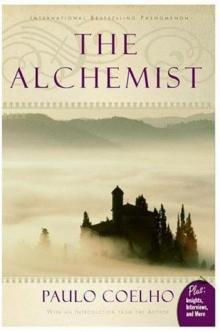 The Alchemist
The Alchemist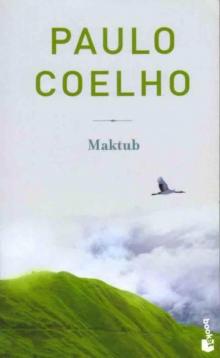 Maktub
Maktub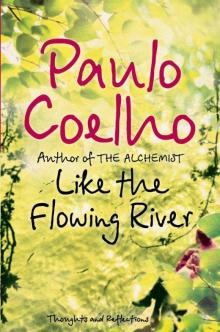 Like the Flowing River
Like the Flowing River The Winner Stands Alone
The Winner Stands Alone The Spy
The Spy By the River Piedra I Sat Down and Wept: A Novel of Forgiveness
By the River Piedra I Sat Down and Wept: A Novel of Forgiveness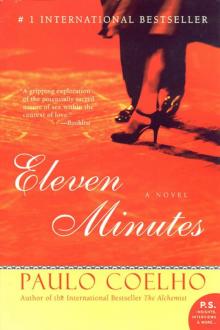 Eleven Minutes
Eleven Minutes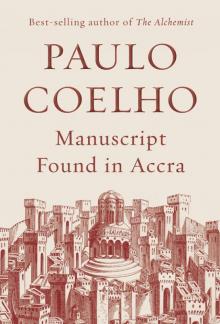 Manuscript Found in Accra
Manuscript Found in Accra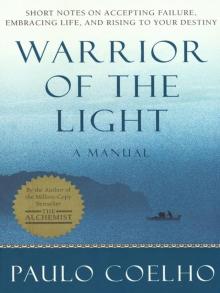 Warrior of the Light
Warrior of the Light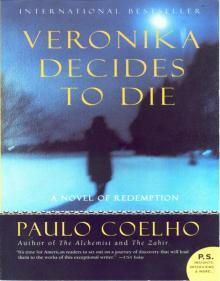 Veronika Decides to Die: A Novel of Redemption
Veronika Decides to Die: A Novel of Redemption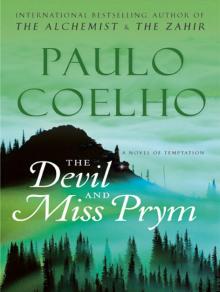 The Devil and Miss Prym: A Novel of Temptation
The Devil and Miss Prym: A Novel of Temptation The Valkyries: An Encounter With Angels
The Valkyries: An Encounter With Angels Brida: A Novel
Brida: A Novel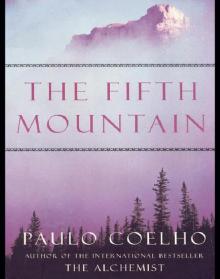 Fifth Mountain: A Novel
Fifth Mountain: A Novel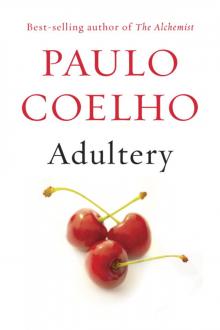 Adultery
Adultery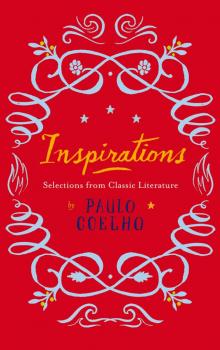 Inspirations
Inspirations The Archer
The Archer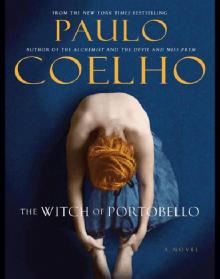 The Witch of Portobello
The Witch of Portobello The Pilgrimage
The Pilgrimage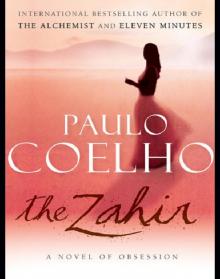 The Zahir
The Zahir Brida
Brida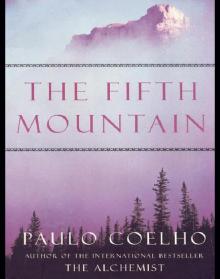 The Fifth Mountain
The Fifth Mountain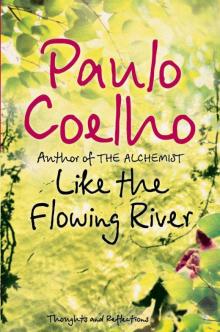 Like the Flowing River: Thoughts and Reflections
Like the Flowing River: Thoughts and Reflections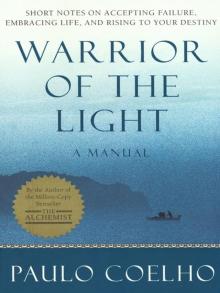 Manual of the Warrior of Light
Manual of the Warrior of Light By The River Piedra I Sat Down & Wept
By The River Piedra I Sat Down & Wept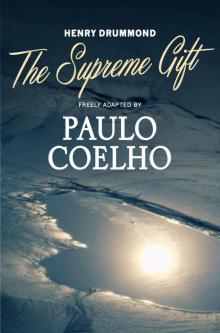 The Supreme Gift
The Supreme Gift Aleph
Aleph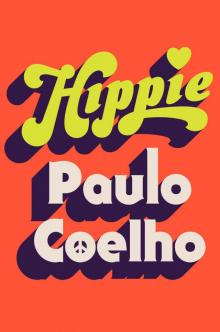 Hippie
Hippie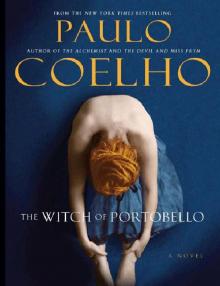 Witch of Portobello
Witch of Portobello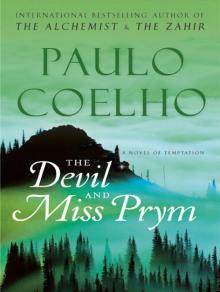 The Devil and Miss Prym
The Devil and Miss Prym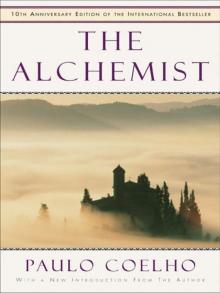 The Alchemist - 10th Anniversary Edition
The Alchemist - 10th Anniversary Edition The Valkyries
The Valkyries